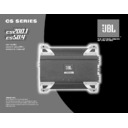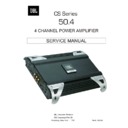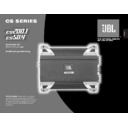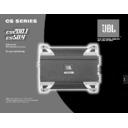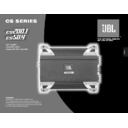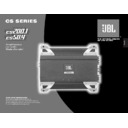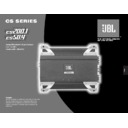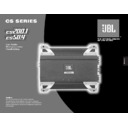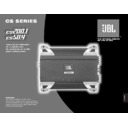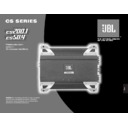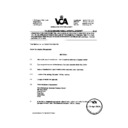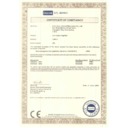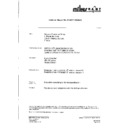JBL CS 50.4 (serv.man13) User Manual / Operation Manual ▷ View online
APPLICATIONS – CS200.1
The CS subwoofer amplifiers are
single-channel amplifiers. There are
two sets of terminals to make it easy
to connect multiple woofers. Either
set of (+/–) terminals may be used when
connecting woofers.
To the right are two application
diagrams to help plan your subwoofer
system installation. Figures 2 and 3
show how to configure the CS200.1
subwoofer amplifiers.
single-channel amplifiers. There are
two sets of terminals to make it easy
to connect multiple woofers. Either
set of (+/–) terminals may be used when
connecting woofers.
To the right are two application
diagrams to help plan your subwoofer
system installation. Figures 2 and 3
show how to configure the CS200.1
subwoofer amplifiers.
NOTE: For simplicity, Figures 2 and 3
do not show power, remote and input
connections.
do not show power, remote and input
connections.
NOTE: Minimum speaker load is
2 ohms.
2 ohms.
3
Figure 2. CS subwoofer amplifier with two
woofer connections.
woofer connections.
Figure 3. CS subwoofer amplifier with one woofer
connection.
connection.
Figure 4. CS50.4 amplifier in 4-channel (stereo)
operation to drive front and rear full-range speakers.
operation to drive front and rear full-range speakers.
APPLICATIONS – CS50.4
The CS50.4 can be set up for stereo
4-channel, 3-channel or bridged
2-channel operation, as shown in
Figures 4 through 6.
4-channel, 3-channel or bridged
2-channel operation, as shown in
Figures 4 through 6.
NOTE: For simplicity, Figures 4 through 6 do
not show power, remote and input
connections.
not show power, remote and input
connections.
NOTE: Minimum speaker impedance for
stereo operation is 2 ohms.
Minimum speaker impedance for bridged
operation is 4 ohms.
stereo operation is 2 ohms.
Minimum speaker impedance for bridged
operation is 4 ohms.
Figure 5. CS50.4 is set up for 3-channel operation to
drive a set of full-range speakers and a subwoofer.
drive a set of full-range speakers and a subwoofer.
Figure 6. CS50.4 used in bridged 2-channel mode
to drive a set of components or subwoofers.
Set crossovers according to application.
to drive a set of components or subwoofers.
Set crossovers according to application.
TROUBLESHOOTING
SYMPTOM
LIKELY CAUSE
SOLUTION
No audio
No voltage at BATT+
Check voltages at
(POWER LED
or REM terminals,
amplifier terminals
are off)
or bad or no ground
with VOM
connection
No audio
Amplifier is
Make sure amplifier
(POWER
overheated
cooling is not blocked
LEDs are on)
at mounting location;
verify speaker system
impedance is within
specified limits
verify speaker system
impedance is within
specified limits
Voltage more than 16V
Check vehicle
or less than 8.5V on
charging system
BATT+ connection
SYMPTOM
LIKELY CAUSE
SOLUTION
No audio
Voltage less than 9V on
Check vehicle
(POWER
BATT+ connection
charging system
LEDs flash)
DC voltage on
Amplifier may need
amplifier output
service; see enclosed
warranty card for
service information
warranty card for
service information
Distorted audio
Input sensitivity is
Check INPUT
not set properly, or
LEVEL setting; or
amplifier or source
check speaker wires
unit is defective
for shorts or grounds
Distorted audio
Short circuit in
Remove speaker leads
and POWER
speaker or wire
one at a time to locate
LED flash
shorted speaker or
wire, then repair
wire, then repair
Music lacks
Speakers are not
Check speaker
“punch”
connected properly
connections for proper polarity
CONTROLS AND SETUP
SETTING THE
CROSSOVER(S)
CROSSOVER(S)
Determine your system plans and set the
crossover mode switch accordingly. If
you plan to use the CS50.4 to drive full-
range speakers, set the crossover mode
to FLAT and skip to “Setting Input Sensi-
tivity.”
crossover mode switch accordingly. If
you plan to use the CS50.4 to drive full-
range speakers, set the crossover mode
to FLAT and skip to “Setting Input Sensi-
tivity.”
Initially set the crossover frequency
control midway. While listening to music,
adjust the crossover for the least per-
ceived distortion from the speakers,
allowing them to reproduce as much bass
as possible.
control midway. While listening to music,
adjust the crossover for the least per-
ceived distortion from the speakers,
allowing them to reproduce as much bass
as possible.
Systems using a separate subwoofer set
the crossover mode to HP (high pass) for
your full-range speakers. Adjust the
crossover frequency to limit bass and
provide increased system volume with
less distortion.
the crossover mode to HP (high pass) for
your full-range speakers. Adjust the
crossover frequency to limit bass and
provide increased system volume with
less distortion.
For subwoofers, choose the highest
frequency that removes vocal information
from the sound of the subwoofer.
frequency that removes vocal information
from the sound of the subwoofer.
If using the CS50.4 to drive a
subwoofer(s), set the crossover mode to
LP (low pass).
subwoofer(s), set the crossover mode to
LP (low pass).
SETTING INPUT
SENSITIVITY
SENSITIVITY
1. Initially turn the INPUT LEVEL control(s)
to minimum (counter clockwise).
2. Reconnect the (–) negative lead to the
vehicle’s battery. Apply power to the
audio system and play a dynamic music
track.
audio system and play a dynamic music
track.
3. On the source unit, increase the vol-
ume control to 3/4 volume. Slowly
increase the INPUT LEVEL control(s)
toward three o’clock until you hear
slight distortion
in the music. Then reduce the INPUT
LEVEL slightly until distortion is no
longer heard.
increase the INPUT LEVEL control(s)
toward three o’clock until you hear
slight distortion
in the music. Then reduce the INPUT
LEVEL slightly until distortion is no
longer heard.
NOTE: After the source unit is on, blue
LEDs (on the top panel) will light, indicat-
ing the amplifier is on. If not, check the
wiring, especially the remote connection
from the source unit. Also refer to
“Troubleshooting” guide below.
LEDs (on the top panel) will light, indicat-
ing the amplifier is on. If not, check the
wiring, especially the remote connection
from the source unit. Also refer to
“Troubleshooting” guide below.
www.jbl.com
JBL Consumer Products
250 Crossways Park Drive,
Woodbury, NY 11797 USA
250 Crossways Park Drive,
Woodbury, NY 11797 USA
© 2004 Harman International Indus-
tries, Incorporated
tries, Incorporated
JBL and Grand Touring are registered
trademarks of Harman International
Industries, Incorporated.
trademarks of Harman International
Industries, Incorporated.
Part No. CSAMPOM3/04
Declaration of Conformity
We, Harman Consumer International
2, route de Tours
72500 Chateau-du-Loir
France
72500 Chateau-du-Loir
France
declare in own responsibility that the product
described in this owner’s manual is in compliance
with technical standards:
described in this owner’s manual is in compliance
with technical standards:
EN 55013:2001
EN 55020:2002
EN 55020:2002
Emmanuel Millot
Harman Consumer International
Chateau-du-Loir, France 1/04
SPECIFICATIONS
CS200.1
• 1 x 236W RMS channel at 4 ohms and
• 1 x 236W RMS channel at 4 ohms and
≤1% THD + N
• Signal-to-noise ratio: 100dBA (reference 1W into 4 ohms)
• 1 x 338W RMS channel at 2 ohms, 14.4V supply and
• 1 x 338W RMS channel at 2 ohms, 14.4V supply and
≤1% THD + N
• Dynamic power: 464W at 2 ohms
• Effective damping factor: 6.395 at 4 ohms
• Frequency response: 10Hz – 302Hz (–3dB)
• Maximum input signal: 7.5V
• Maximum sensitivity: 260mV
• Output regulation: .073dB at 4 ohms
• Dimensions (L x W x H): 295x313x60mm
• Effective damping factor: 6.395 at 4 ohms
• Frequency response: 10Hz – 302Hz (–3dB)
• Maximum input signal: 7.5V
• Maximum sensitivity: 260mV
• Output regulation: .073dB at 4 ohms
• Dimensions (L x W x H): 295x313x60mm
(11-5/8" x 12-5/16" x 2-3/8")
• Fuses: 20A x 2
CS50.4
• 4 x 67W RMS channels at 4 ohms and
• 4 x 67W RMS channels at 4 ohms and
≤1% THD + N
• Signal-to-noise ratio: 86dBA (reference 1W into 4 ohms)
• 4 x 82W RMS channels at 2 ohms, 14.4V supply and
• 4 x 82W RMS channels at 2 ohms, 14.4V supply and
≤1% THD + N
• 2 x 162W RMS channels at 4 ohms, 14.4V supply and
≤1% THD + N
• Dynamic power: 145W at 2 ohms
• Effective damping factor: 6.395 at 4 ohms
• Frequency response: 10Hz – 27kHz (–3dB)
• Maximum input signal: 6V
• Maximum sensitivity: 240mV
• Output regulation: .032dB at 4 ohms
• Dimensions (L x W x H): 384x313x60mm
• Effective damping factor: 6.395 at 4 ohms
• Frequency response: 10Hz – 27kHz (–3dB)
• Maximum input signal: 6V
• Maximum sensitivity: 240mV
• Output regulation: .032dB at 4 ohms
• Dimensions (L x W x H): 384x313x60mm
(15-1/8" x 12-5/16" x 2-3/8")
• Fuses: 25A x 2
Features, specifications and appearance
are subject to change without notice.
are subject to change without notice.
TROUBLESHOOTING
SYMPTOM
LIKELY CAUSE
SOLUTION
No audio
No voltage at BATT+
Check voltages at
(POWER LED
or REM terminals,
amplifier terminals
are off)
or bad or no ground
with VOM
connection
No audio
Amplifier is
Make sure amplifier
(POWER
overheated
cooling is not blocked
LEDs are on)
at mounting location;
verify speaker system
impedance is within
specified limits
verify speaker system
impedance is within
specified limits
Voltage more than 16V
Check vehicle
or less than 8.5V on
charging system
BATT+ connection
SYMPTOM
LIKELY CAUSE
SOLUTION
No audio
Voltage less than 9V on
Check vehicle
(POWER
BATT+ connection
charging system
LEDs flash)
DC voltage on
Amplifier may need
amplifier output
service; see enclosed
warranty card for
service information
warranty card for
service information
Distorted audio
Input sensitivity is
Check INPUT
not set properly, or
LEVEL setting; or
amplifier or source
check speaker wires
unit is defective
for shorts or grounds
Distorted audio
Short circuit in
Remove speaker leads
and POWER
speaker or wire
one at a time to locate
LED flash
shorted speaker or
wire, then repair
wire, then repair
Music lacks
Speakers are not
Check speaker
“punch”
connected properly
connections for proper polarity
CONTROLS AND SETUP
SETTING THE
CROSSOVER(S)
CROSSOVER(S)
Determine your system plans and set the
crossover mode switch accordingly. If
you plan to use the CS50.4 to drive full-
range speakers, set the crossover mode
to FLAT and skip to “Setting Input Sensi-
tivity.”
crossover mode switch accordingly. If
you plan to use the CS50.4 to drive full-
range speakers, set the crossover mode
to FLAT and skip to “Setting Input Sensi-
tivity.”
Initially set the crossover frequency
control midway. While listening to music,
adjust the crossover for the least per-
ceived distortion from the speakers,
allowing them to reproduce as much bass
as possible.
control midway. While listening to music,
adjust the crossover for the least per-
ceived distortion from the speakers,
allowing them to reproduce as much bass
as possible.
Systems using a separate subwoofer set
the crossover mode to HP (high pass) for
your full-range speakers. Adjust the
crossover frequency to limit bass and
provide increased system volume with
less distortion.
the crossover mode to HP (high pass) for
your full-range speakers. Adjust the
crossover frequency to limit bass and
provide increased system volume with
less distortion.
For subwoofers, choose the highest
frequency that removes vocal information
from the sound of the subwoofer.
frequency that removes vocal information
from the sound of the subwoofer.
If using the CS50.4 to drive a
subwoofer(s), set the crossover mode to
LP (low pass).
subwoofer(s), set the crossover mode to
LP (low pass).
SETTING INPUT
SENSITIVITY
SENSITIVITY
1. Initially turn the INPUT LEVEL control(s)
to minimum (counter clockwise).
2. Reconnect the (–) negative lead to the
vehicle’s battery. Apply power to the
audio system and play a dynamic music
track.
audio system and play a dynamic music
track.
3. On the source unit, increase the vol-
ume control to 3/4 volume. Slowly
increase the INPUT LEVEL control(s)
toward three o’clock until you hear
slight distortion
in the music. Then reduce the INPUT
LEVEL slightly until distortion is no
longer heard.
increase the INPUT LEVEL control(s)
toward three o’clock until you hear
slight distortion
in the music. Then reduce the INPUT
LEVEL slightly until distortion is no
longer heard.
NOTE: After the source unit is on, blue
LEDs (on the top panel) will light, indicat-
ing the amplifier is on. If not, check the
wiring, especially the remote connection
from the source unit. Also refer to
“Troubleshooting” guide below.
LEDs (on the top panel) will light, indicat-
ing the amplifier is on. If not, check the
wiring, especially the remote connection
from the source unit. Also refer to
“Troubleshooting” guide below.
www.jbl.com
JBL Consumer Products
250 Crossways Park Drive,
Woodbury, NY 11797 USA
250 Crossways Park Drive,
Woodbury, NY 11797 USA
© 2004 Harman International Indus-
tries, Incorporated
tries, Incorporated
JBL and Grand Touring are registered
trademarks of Harman International
Industries, Incorporated.
trademarks of Harman International
Industries, Incorporated.
Part No. CSAMPOM3/04
Declaration of Conformity
We, Harman Consumer International
2, route de Tours
72500 Chateau-du-Loir
France
72500 Chateau-du-Loir
France
declare in own responsibility that the product
described in this owner’s manual is in compliance
with technical standards:
described in this owner’s manual is in compliance
with technical standards:
EN 55013:2001
EN 55020:2002
EN 55020:2002
Emmanuel Millot
Harman Consumer International
Chateau-du-Loir, France 1/04
SPECIFICATIONS
CS200.1
• 1 x 236W RMS channel at 4 ohms and
• 1 x 236W RMS channel at 4 ohms and
≤1% THD + N
• Signal-to-noise ratio: 100dBA (reference 1W into 4 ohms)
• 1 x 338W RMS channel at 2 ohms, 14.4V supply and
• 1 x 338W RMS channel at 2 ohms, 14.4V supply and
≤1% THD + N
• Dynamic power: 464W at 2 ohms
• Effective damping factor: 6.395 at 4 ohms
• Frequency response: 10Hz – 302Hz (–3dB)
• Maximum input signal: 7.5V
• Maximum sensitivity: 260mV
• Output regulation: .073dB at 4 ohms
• Dimensions (L x W x H): 295x313x60mm
• Effective damping factor: 6.395 at 4 ohms
• Frequency response: 10Hz – 302Hz (–3dB)
• Maximum input signal: 7.5V
• Maximum sensitivity: 260mV
• Output regulation: .073dB at 4 ohms
• Dimensions (L x W x H): 295x313x60mm
(11-5/8" x 12-5/16" x 2-3/8")
• Fuses: 20A x 2
CS50.4
• 4 x 67W RMS channels at 4 ohms and
• 4 x 67W RMS channels at 4 ohms and
≤1% THD + N
• Signal-to-noise ratio: 86dBA (reference 1W into 4 ohms)
• 4 x 82W RMS channels at 2 ohms, 14.4V supply and
• 4 x 82W RMS channels at 2 ohms, 14.4V supply and
≤1% THD + N
• 2 x 162W RMS channels at 4 ohms, 14.4V supply and
≤1% THD + N
• Dynamic power: 145W at 2 ohms
• Effective damping factor: 6.395 at 4 ohms
• Frequency response: 10Hz – 27kHz (–3dB)
• Maximum input signal: 6V
• Maximum sensitivity: 240mV
• Output regulation: .032dB at 4 ohms
• Dimensions (L x W x H): 384x313x60mm
• Effective damping factor: 6.395 at 4 ohms
• Frequency response: 10Hz – 27kHz (–3dB)
• Maximum input signal: 6V
• Maximum sensitivity: 240mV
• Output regulation: .032dB at 4 ohms
• Dimensions (L x W x H): 384x313x60mm
(15-1/8" x 12-5/16" x 2-3/8")
• Fuses: 25A x 2
Features, specifications and appearance
are subject to change without notice.
are subject to change without notice.
TROUBLESHOOTING
SYMPTOM
LIKELY CAUSE
SOLUTION
No audio
No voltage at BATT+
Check voltages at
(POWER LED
or REM terminals,
amplifier terminals
are off)
or bad or no ground
with VOM
connection
No audio
Amplifier is
Make sure amplifier
(POWER
overheated
cooling is not blocked
LEDs are on)
at mounting location;
verify speaker system
impedance is within
specified limits
verify speaker system
impedance is within
specified limits
Voltage more than 16V
Check vehicle
or less than 8.5V on
charging system
BATT+ connection
SYMPTOM
LIKELY CAUSE
SOLUTION
No audio
Voltage less than 9V on
Check vehicle
(POWER
BATT+ connection
charging system
LEDs flash)
DC voltage on
Amplifier may need
amplifier output
service; see enclosed
warranty card for
service information
warranty card for
service information
Distorted audio
Input sensitivity is
Check INPUT
not set properly, or
LEVEL setting; or
amplifier or source
check speaker wires
unit is defective
for shorts or grounds
Distorted audio
Short circuit in
Remove speaker leads
and POWER
speaker or wire
one at a time to locate
LED flash
shorted speaker or
wire, then repair
wire, then repair
Music lacks
Speakers are not
Check speaker
“punch”
connected properly
connections for proper polarity
CONTROLS AND SETUP
SETTING THE
CROSSOVER(S)
CROSSOVER(S)
Determine your system plans and set the
crossover mode switch accordingly. If
you plan to use the CS50.4 to drive full-
range speakers, set the crossover mode
to FLAT and skip to “Setting Input Sensi-
tivity.”
crossover mode switch accordingly. If
you plan to use the CS50.4 to drive full-
range speakers, set the crossover mode
to FLAT and skip to “Setting Input Sensi-
tivity.”
Initially set the crossover frequency
control midway. While listening to music,
adjust the crossover for the least per-
ceived distortion from the speakers,
allowing them to reproduce as much bass
as possible.
control midway. While listening to music,
adjust the crossover for the least per-
ceived distortion from the speakers,
allowing them to reproduce as much bass
as possible.
Systems using a separate subwoofer set
the crossover mode to HP (high pass) for
your full-range speakers. Adjust the
crossover frequency to limit bass and
provide increased system volume with
less distortion.
the crossover mode to HP (high pass) for
your full-range speakers. Adjust the
crossover frequency to limit bass and
provide increased system volume with
less distortion.
For subwoofers, choose the highest
frequency that removes vocal information
from the sound of the subwoofer.
frequency that removes vocal information
from the sound of the subwoofer.
If using the CS50.4 to drive a
subwoofer(s), set the crossover mode to
LP (low pass).
subwoofer(s), set the crossover mode to
LP (low pass).
SETTING INPUT
SENSITIVITY
SENSITIVITY
1. Initially turn the INPUT LEVEL control(s)
to minimum (counter clockwise).
2. Reconnect the (–) negative lead to the
vehicle’s battery. Apply power to the
audio system and play a dynamic music
track.
audio system and play a dynamic music
track.
3. On the source unit, increase the vol-
ume control to 3/4 volume. Slowly
increase the INPUT LEVEL control(s)
toward three o’clock until you hear
slight distortion
in the music. Then reduce the INPUT
LEVEL slightly until distortion is no
longer heard.
increase the INPUT LEVEL control(s)
toward three o’clock until you hear
slight distortion
in the music. Then reduce the INPUT
LEVEL slightly until distortion is no
longer heard.
NOTE: After the source unit is on, blue
LEDs (on the top panel) will light, indicat-
ing the amplifier is on. If not, check the
wiring, especially the remote connection
from the source unit. Also refer to
“Troubleshooting” guide below.
LEDs (on the top panel) will light, indicat-
ing the amplifier is on. If not, check the
wiring, especially the remote connection
from the source unit. Also refer to
“Troubleshooting” guide below.
www.jbl.com
JBL Consumer Products
250 Crossways Park Drive,
Woodbury, NY 11797 USA
250 Crossways Park Drive,
Woodbury, NY 11797 USA
© 2004 Harman International Indus-
tries, Incorporated
tries, Incorporated
JBL and Grand Touring are registered
trademarks of Harman International
Industries, Incorporated.
trademarks of Harman International
Industries, Incorporated.
Part No. CSAMPOM3/04
Declaration of Conformity
We, Harman Consumer International
2, route de Tours
72500 Chateau-du-Loir
France
72500 Chateau-du-Loir
France
declare in own responsibility that the product
described in this owner’s manual is in compliance
with technical standards:
described in this owner’s manual is in compliance
with technical standards:
EN 55013:2001
EN 55020:2002
EN 55020:2002
Emmanuel Millot
Harman Consumer International
Chateau-du-Loir, France 1/04
SPECIFICATIONS
CS200.1
• 1 x 236W RMS channel at 4 ohms and
• 1 x 236W RMS channel at 4 ohms and
≤1% THD + N
• Signal-to-noise ratio: 100dBA (reference 1W into 4 ohms)
• 1 x 338W RMS channel at 2 ohms, 14.4V supply and
• 1 x 338W RMS channel at 2 ohms, 14.4V supply and
≤1% THD + N
• Dynamic power: 464W at 2 ohms
• Effective damping factor: 6.395 at 4 ohms
• Frequency response: 10Hz – 302Hz (–3dB)
• Maximum input signal: 7.5V
• Maximum sensitivity: 260mV
• Output regulation: .073dB at 4 ohms
• Dimensions (L x W x H): 295x313x60mm
• Effective damping factor: 6.395 at 4 ohms
• Frequency response: 10Hz – 302Hz (–3dB)
• Maximum input signal: 7.5V
• Maximum sensitivity: 260mV
• Output regulation: .073dB at 4 ohms
• Dimensions (L x W x H): 295x313x60mm
(11-5/8" x 12-5/16" x 2-3/8")
• Fuses: 20A x 2
CS50.4
• 4 x 67W RMS channels at 4 ohms and
• 4 x 67W RMS channels at 4 ohms and
≤1% THD + N
• Signal-to-noise ratio: 86dBA (reference 1W into 4 ohms)
• 4 x 82W RMS channels at 2 ohms, 14.4V supply and
• 4 x 82W RMS channels at 2 ohms, 14.4V supply and
≤1% THD + N
• 2 x 162W RMS channels at 4 ohms, 14.4V supply and
≤1% THD + N
• Dynamic power: 145W at 2 ohms
• Effective damping factor: 6.395 at 4 ohms
• Frequency response: 10Hz – 27kHz (–3dB)
• Maximum input signal: 6V
• Maximum sensitivity: 240mV
• Output regulation: .032dB at 4 ohms
• Dimensions (L x W x H): 384x313x60mm
• Effective damping factor: 6.395 at 4 ohms
• Frequency response: 10Hz – 27kHz (–3dB)
• Maximum input signal: 6V
• Maximum sensitivity: 240mV
• Output regulation: .032dB at 4 ohms
• Dimensions (L x W x H): 384x313x60mm
(15-1/8" x 12-5/16" x 2-3/8")
• Fuses: 25A x 2
Features, specifications and appearance
are subject to change without notice.
are subject to change without notice.
Display

